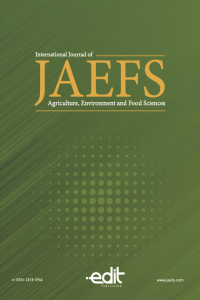Extension’s role and stakeholders’ intervention in climate change advocacy
The world’s agricultural system has been terribly affected by climate change and consequently the future of agriculture, its practices and productivity is hampered. Hence, this paper presents the agricultural and environmental problems associated with climate change and seeks to proffer possible solutions through the intervention of extension services and stakeholders. It focuses on the role of agricultural extension and its immense import in influencing crop production practices that will ensure sustainability and improve soil management. To effect a change in a diverging economy with critical climatic conditions, it becomes imperative that scientific, technological and conceptual policy practices that will reduce negative environmental impacts must be integrated and implemented.
Keywords:
Agricultural advisory services, Agricultural production practices, Climate change Mitigating factors,
___
- Agwu, J. and Okhimamhe, A. (2009). Climate change, its impact and adaptation: Gender perspective from the Northern and Eastern Nigeria. Heinrich Boll Stiffing Publisher, Available at www.Boeunigeria.org:1-71
- Ajetunmobi, J. and Abiodun, A. (2010). Climate change Impacts on cowpea productivity in Nigeria. Journal of Food, Agriculture, Nutrition and Development 10 (3): 2258-2271.
- Apata, G. T. (2010) Effects of global climate change on Nigerian agriculture: An empirical analysis. Central Bank of Nigeria CBN Journal of Applied Statistics 2:1
- Sajjad, A., Yung, L., Ishaq, M. Shah, T., Abdulai, Hyas, A. and Izhar Ud Din (2017). Climate change and its impact on the yield of major food crops: Evidence from Pakistan MDPP. Foods 6-8.
- IPCC, (2015). Climate Change 2014: Synthesis report. Core Writing Team, R. Pachuni, L.A. Meyers (Eds), Contribution of working groups 1, 11, &111 to the fifth assessment. report of the intergovernmental panel on climate change IPCC, Geneva Switzerland.
- IPCC, (2007). Impacts, Adaptation and Vulnerability. Contribution of working group 11 to the fourth assessment. Report of the Intergovernmental panel on climate change. Cambridge University press, Cambridge U.K. M. L. Parry, O.F. Cariziani, J. P. Palutikof, P.J. Van der Linden and C.E. Hanson, Eds.
- Simelton, C.H. Quinn, N. Batisani, A.J. Dougil, J.C. Dyer, E.D. Fraser, D. Mkwambisi, S. Sallu, Stringer, L.C. (2013). Is rainfall changing? Farmers’ perceptions, metrological data, policy implication. Climate Development. 123-138.
- IPCC, (2013). The physical science basis: Working group 1 contribution to the fifth assessment report of the intergovernmental panel on climate change. Cambridge University Press.
- IPCC, (2014). Climate Change 2014-Impacts, adaptations and vulnerability: Regional Aspects. Cambridge University Press.
- Saul, E. (2015). Impact of climate change on agriculture and food security in Nigeria: Challenges and adaptation. Global Advanced Research Journal of Medicinal Plant (GARJMP) 3 (1).
- Narain D. (1985). Agricultural change and rural poverty variations on a theme (Eds) Mellor , J. W. and Desai, G. M. 183 IFPRI. The John Hopkins University Press Baltimore, Maryland.
- Enete, A.A. and Amusa, T. A. (2010). Challenges of agricultural adaptation to climate change in Nigeria. A synthesis from the Literature. 4. The Journal of Field Actions and Field Actions. Science Reports facts report.
- Prokopy, L. N., Barrtels, Wendy-Lin, Burniske G. and Power R. (2017). Agricultural extension and climate change communication. Oxford Research Encyclopedia, Oxford University Press.
- AGRA, (2017). The smart way to help African farmers tackle climate change. Agrra.org/news/the-smart-way-to-help- african-farmers-tackle-climate-change.
- Crispino, L. (2011). Mainstreaming climate change adaptation: The need and the role of civil society organizations. World Resort Report. Watershed Organization Trust (WOTR).
- Aloni, C., Daminabo I, Alexander, B.C., Bakpo M.T. (2015). The Importance of stakeholders involvement in environmental impact assessment Resources and Environment 5 (5):146-151. Scientific and Academic Publishing.
- IFAD, (2016). International Fund for Agricultural Development, Rural development report 2016. Fostering inclusive rural transformation. Rome, Italy.
- BNRCC, (2017). Building Nigeria Responses to Climate Change aims to help build informed responses to climate change in Nigeria by enhancing capacity at the community, state and national level. developmentaid.org/#/organizations/view/76707/bnrcc-building-nigerias- response-to-climate-change.
- FAO, (2016). The state of food and agriculture. Climate change, agriculture and food Security. UN.
- CBN, (2012). Central Bank of Nigeria, first quarter GDP Report 2012 at cbn.gov.ng/out/2012/pubications/reports/gov/gdp%20report.pdf
- Amanchukwu R.N. (2015). Climate change education in Nigeria: The role of curriculum review. Scientific and Academic Publishing 5 (3):71-79.
- Akinbobola, O., Adedokun, S.S. and Nwosa, P.I. (2015). The Impact of climate change on composition of agricultural output in Nigeria. American Journal of Environmental Protection. 3( 2): 44-47
- Apata, O.M. (2016). Adaptation strategies to effect climate change on arable crop production in SW Nigeria. British Journal of Applied science and technology. 12 (5): 1-7.
- CGIAR, (2011). Consultant Group for International Agricultural Research, research program on climate change, agriculture and food security (CCAFS). Available at: cigar.org/about-us/cigar-portfolio-2010-2016/cigar-research-program-on-climate-change-agriculture-and-food-security-ccafs.
- Simmons, S.E. (2013). Assuming food and nutrition security in Africa by 2020. Highlight perspective from USAID. www. 113d.ca/sd/ifpri/sdvol 58 num5e.html-31k. Accessed December 13 2013.
- Yayın Aralığı: Yılda 4 Sayı
- Başlangıç: 2017
- Yayıncı: Gültekin ÖZDEMİR
Sayıdaki Diğer Makaleler
Victor ADJEİ, Rosina KYEREMATEN
Fatma Çiğdem SAKİNOĞLU ORUÇ, İlkay EJDER ERTURAN, Deniz ORUÇ, Sadık Hasan ORUÇ
İbraheem ALHASSAN, Auwalu GARBA GASHUA, Sunday DOGO, Mahmud SANİ
Manoj KANDEL, Surya Kant GHİMİRE, Bishnu Raj OJHA, Jiban SHRESTHA
Nilda ERSOY, Volkan OKATAN, Deniz HAZAR, İbrahim BAKTIR
Vedat PİRİNC, Abdurrahman KARA, Zafer AKTURK, Songül AKİN
Mehmet POLAT, Volkan OKATAN, Sultan Filiz GÜÇLÜ, Ayşen Melda ÇOLAK
